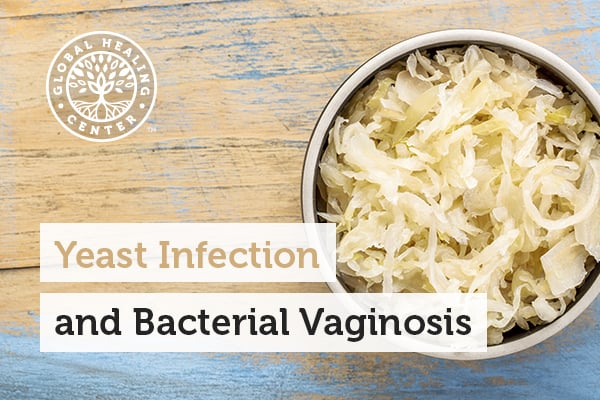
Bacterial vaginosis (BV) is the most common type of vaginal infection, followed by yeast infections. The primary causes of infections are bacterial imbalance - namely an excess of harmful bacteria - or Candida. Both conditions can lead to an unpleasant set of symptoms, including an unusual discharge, a strong, fish-like odor (especially after sex), burning during urination, itching around the outside of the vagina, and vaginal irritation. Some of the more prevalent symptoms of yeast infections are burning, redness, and swelling of the vagina and/or vulva, pain during urination, pain during sex, soreness, and a thick white discharge. [1] [2]
How Do Antibiotics Affect the Vaginal Flora?
Antibiotics and anti-fungal medications are some of the most common treatments for BV and yeast infections. While these might treat the infection itself, they may cause some harm, too. These antibiotics and medicines actually kill off both the good and bad bacteria in the vagina. And not only that, they also kill off many favorable bacteria in the gut as well. When antibiotics disrupt intestinal flora like this, it can lead to a weakened immune system, poor digestion, and even instigate severe digestive disorders. As for the vagina itself, the lack in good bacteria can contribute to an increased likelihood of urinary tract infections and even vaginal candidiasis occurring as a result of the regrowth of harmful bacteria and fungi. [3]
Supporting Vaginal Flora with Probiotics
Since bacterial vaginosis and yeast infections are both so often caused by an excess of harmful bacteria in the vagina, it’s important to find ways to support vaginal flora (good bacteria). Studies have shown that taking probiotics along with antibiotics is an effective approach with the best long-term results. [4] Probiotic supplements containing the Lactobacillus bacteria (a good bacteria) have been shown to be especially helpful for encouraging a balanced vaginal environment. [5] Of course, that’s not everything probiotics can do for a woman’s body.
The Role of Beneficial Bacteria in Women’s Health
The importance of probiotics in women’s health is becoming better understood. In addition to supporting a healthier vagina and urinary tract, probiotics also support digestion. [6] As an example, irritable bowel syndrome is more common in women than men, [7] but probiotics have been shown to help ease discomfort in women dealing with this condition. [8]
Probiotics also keep the vaginal environment more acidic which helps promote favorable balance. [9] Women who consume probiotics regularly (whether through diet or supplementation) and eat alkaline foods significantly increase their chances of normal, vaginal balance.[10] If you’re looking to add probiotics to your diet, a few of the best options include:
- Yogurt with live, active strains (look specifically for live strains)
- Kefir
- Kombucha
- Fermented foods like sauerkraut, kimchi, tempeh and pickles
- Miso soup
References (10)
- "Bacterial Vaginosis"Office of Women’s Health, Department of Health and Human Services, last updated May 26, 2015.
- "Vaginal Yeast Infection" Office of Women’s Health, Department of Health and Human Services, last updated January 6, 2015.
- Kurowski K1, Ghosh R, Singh SK, Beaman KD. "Clarithromycin-induced alterations in vaginal flora". Am J Ther. 2000 Sep;7(5):291-5.
- Pendharkar S1, Brandsborg E2, Hammarström L3, Marcotte H4, Larsson PG5. "Vaginal colonisation by probiotic lactobacilli and clinical outcome in women conventionally treated for bacterial vaginosis and yeast infection". BMC Infect Dis. 2015 Jul 3;15:255. doi: 10.1186/s12879-015-0971-3.
- Cribby S, Taylor M, Reid G. Vaginal Microbiota and the Use of Probiotics. Interdisciplinary Perspectives on Infectious Diseases. 2008;2008:256490. doi:10.1155/2008/256490.
- Harvard Medical School. “Health Benefits of Taking Probiotics”. Harvard Health Publications, last updated December 1, 2015.
- Lee SY, Kim JH, Sung IK, Park HS, Jin CJ, Choe WH, Kwon SY, Lee CH, Choi KW. Irritable Bowel Syndrome Is More Common in Women Regardless of the Menstrual Phase: A Rome II-based Survey. J Korean Med Sci. 2007 Oct; 22(5): 851–854. Published online 2007 Oct 31. doi: 10.3346/jkms.2007.22.5.851.
- Aragon G, MD, Graham DB, MD, Borum M, MD, EdD, MPH, Doman DB, MD, FACP, FACG. Probiotic Therapy for Irritable Bowel Syndrome. Gastroenterol Hepatol (N Y). 2010 Jan; 6(1): 39–44.
- Waigankar SS, Patel V. Role of Probiotics in Urogenital Healthcare. J Midlife Health. 2011 Jan-Jun; 2(1): 5–10. doi: 10.4103/0976-7800.83253.
- Lactobacillus. Medline Plus, last reviewed February 15, 2015.
†Results may vary. Information and statements made are for education purposes and are not intended to replace the advice of your doctor. If you have a severe medical condition or health concern, see your physician.







